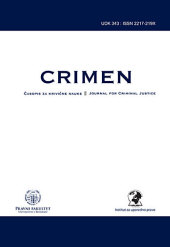DA LI JE SRBIJI POTREBNA REFORMA KRIVIČNOG ZAKONODAVSTVA?
DOES SERBIA NEED A CRIMINAL LEGISLATION REFORM?
Author(s): Zoran StojanovićSubject(s): Criminal Law, Criminology
Published by: Правни факултет Универзитета у Београду
Keywords: reform of the criminal law; house arrest; probation; criminalization; decriminalization; fine; punishment;
Summary/Abstract: Amendments to the Criminal Code (CC) enacted in December 2012, represent a step forward in improving Serbia’s criminal legislation. This paper offers an analysis and evaluation of the new solutions. The author points out that some important issues are left to be addressed by future amendments to the Criminal Code. As stated in the paper, different drafting is required, inter alia, regarding criminal offences associated with narcotic drugs which, though amended in 2009, are not satisfactory and they keep creating problems in jurisprudence. Still, the general climate, as part of the necessary preconditions for a successful reform, cannot be presently assessed as favorable. Although there is a noticeably more serious approach to the preparations for amending criminal legislation compared to that observed in the past several years, overly repressive public aspirations, driven by strong emotions and, often, irrational reasons, fueled by most of the media, seem to be as intense as ever. Such aspirations which find draconic punishment to be the solution to existing social problems can only hurt criminal law as a rational system of criminal norms. The “punishment frenzy” in Serbia does not come solely as a consequence of the conviction that this is an effective way to suppress criminality but also as a result of popularly-shared belief that severe punishments can provide a higher level of social justice. However, overreaction in terms of punishment as a compensation for the shortage of justice has its disadvantages and it can, in the best case scenario, only calm down the public to a certain extent, but certainly not bring true justice. A moderate, rational and realistically grounded criminal legislation would stand a better chance of successfully realizing its function than its excessively broad and overly severe counterpart. Amendments to the CC entered in 2012 represent a discontinuation relative to those adopted in 2009 which contained poor solutions with respect to a multitude of issues in both essential and legislative and technical sense. Still, signals coming from debates held in the National Assembly whenever criminal law matter is on the agenda, are not promising. They indicate a climate not so favorable for further improvement of criminal legislation. A comprehensive reform of criminal legislation requires a relatively stable social, political and economic situation.
Journal: CRIMEN - časopis za krivične nauke
- Issue Year: 2013
- Issue No: 2
- Page Range: 119-143
- Page Count: 25
- Language: Serbian

